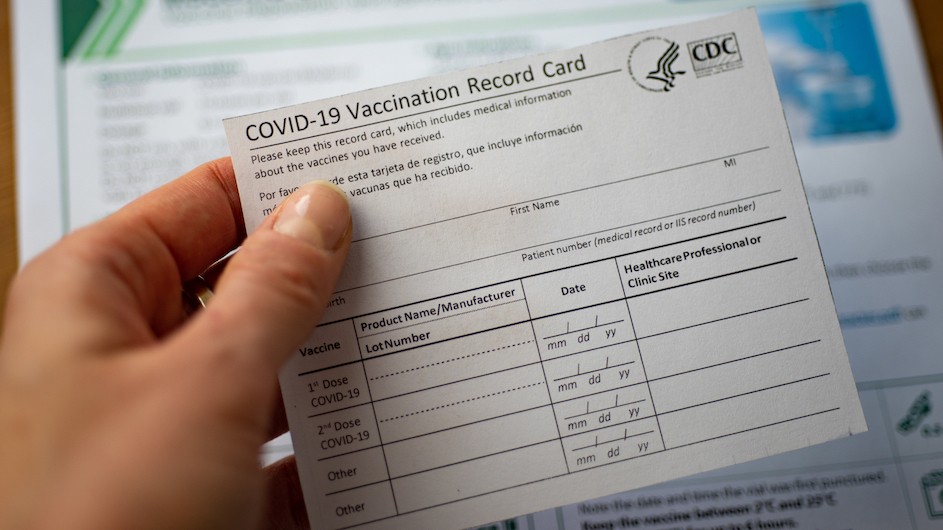What We Learned About Vaccine Hesitancy and How to Overcome It
Four political science PhD students surveyed residents from six Latin American countries about their willingness to get a COVID vaccine. What they learned could help reduce vaccine hesitancy here in the United States and around the world.

"Tell Me About It" is a series in which Columbia University students are invited to share their opinions and insights on issues related to their academic research and how it pertains to the real world.
This column is editorially independent of Columbia News.
Vaccines against COVID-19 have become increasingly available for the mass public in various countries. However, in many places the pace of vaccination has slowed down, likely delaying herd immunity. Part of the explanation relies on vaccine hesitant individuals, who resist vaccination for any number of reasons. Our research on the causes and potential solutions to vaccine hesitancy, done together with Professors Sarah Daly and John Marshall of Columbia’s Political Science department, may help overcome this phenomenon.
In a survey conducted in January 2021, in six Latin American countries, we found that vaccine hesitancy may be a major stumbling block for vaccination campaigns. Only 59 percent of respondents said they would get vaccinated if a vaccine were available to them, far below the estimated threshold of at least 70 percent that experts say may be needed for herd immunity. Moreover, respondents said that, on average, they would wait 4.3 months before getting vaccinated, drawing out the pandemic and giving the virus more time to mutate. When asked about why they were hesitant about getting vaccinated, respondents cited concerns about side effects, that the vaccine was developed too fast, and mistrust in the government.
What, then, can be done to reduce vaccine hesitancy?
Messaging Interventions that Increase COVID-19 Vaccine Willingness in Latin America
In our survey, we tested out different messaging strategies that could mitigate vaccine hesitancy, using survey experiments to isolate the effect of each message on vaccine hesitancy. Focusing only on hesitant individuals, we provided information about the safety and effectiveness of vaccines and about rates of vaccination needed for herd immunity and of how many people in their countries were willing to get vaccinated based on initial rounds of our survey. We also showed respondents messages that emphasized economic, altruistic, or social appeals: how getting vaccinated can help the economy recover, protect the vulnerable, or improve their own social standing.
Our results show that vaccine hesitancy can be reduced with basic information and with appeals to social incentives. We found that information about the safety and efficacy of vaccines persuades about 8 percent of hesitant individuals to become willing to get vaccinated while reducing the time they would wait to get vaccinated by 0.4 months. That basic information can help ease concerns about vaccination suggests that there is a benefit to targeting hesitant individuals with accurate information that may otherwise get lost amid the overabundance of constantly changing vaccine news.
Columbia World Projects Uses Data and Comparative Literature to Combat Vaccine Hesitancy
We also found that information about the rate of vaccine uptake can increase willingness to get vaccinated but only when it’s above the estimated thresholds for herd immunity. We interpret this finding as indicating that people may be more willing to get vaccinated when they feel that they are contributing to a successful collective effort that achieves herd immunity and that they are part of a winning team against COVID-19.
Notably, the message appealing to social esteem had a substantive impact: it persuaded 7.9 percent of hesitant respondents to agree to vaccination. Meanwhile, the messages appealing to economic recovery or altruism did not encourage vaccination among the hesitant. These results show social incentives to be a simple yet powerful tool for encouraging vaccination. Policymakers could easily harness these benefits by making vaccination status more visible with stickers, bracelets, or social media filters and tags.
Vaccine hesitancy can be a major barrier to herd immunity. But our research shows that some hesitant individuals can be persuaded to get vaccinated with simple messaging interventions. For these individuals, vaccination campaigns can increase uptake by:
1. Targeting them with basic information about the safety and efficacy of vaccines.
2. Emphasizing the success of the collective vaccination effort.
3. Facilitating ways of showing off vaccination status.
Oscar Pocasangre is a PhD candidate in the department of political science. Follow him on Twitter @oscarpocasangre.
Fellow political science PhD candidates Elena Barham (@elena_barham), Julian Gerez (@julianegerez), and Pablo Argote (@pabloargotet) contributed to this article.